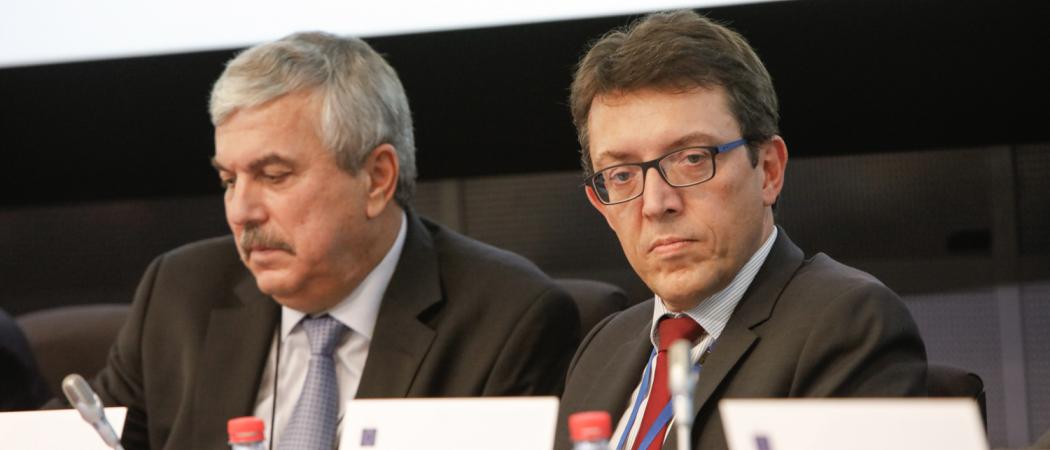Committee of the Regions throws some weight behind the proposal to use quotas to bridge the west - east research and innovation gap under Horizon Europe

MEP Dan Nica (left) and CoR member Christophe Clergeau at the 131st plenary session of the European Committee of the Regions. (Photo: European Union / Aude Vanlathem)
The Committee of the Regions (CoR) gets behind Horizon Europe rapporteur MEP Dan Nica in the battle for a more even spread of research and innovation funding, in a report this week voicing concerns over the growing inequalities between the regions which benefit hugely from the EU’s R&D programmes, and those which do not.
Speaking at the launch of the report, Nica said he feels, “More encouraged and inspired by the Committee of the Regions support.”
The report by CoR member and Horizon Europe rapporteur Christophe Clergeau, argues that poorer regions in Europe will suffer a double hit in the 2021-27 budget cycle. Development in poorer regions may slow down because of proposed cuts to cohesion and regional development funds, leaving them unable to compete with richer regions for EU research money under Horizon Europe.
"The steps taken to close the gaps between regions and promote access for all to Horizon Europe are insufficient to improve the level of scientific excellence in Europe as a whole, and not just in a few large regions and cities,” Cergeau said, speaking at CoR’s plenary meeting in Brussels on Tuesday.
CoR’s view is reflected in an amendment to the Horizon Europe legal text proposed by Nica, which calls for, “The effective reduction of the R&D and innovation divide by 50 per cent within the Union and [to] promote broad geographical coverage in collaborative projects.”
But the idea has been roundly rejected by Commission officials, universities, and other MEPs, who believe that the way to end the research and innovation divide is through increasing national R&D budgets, and by better coordination between Horizon Europe and other EU funds.
The regions do not fully agree with that view and vow to, “lead a cultural battle with the Commission,” said Clergeau, a member of the Pays-de-la-Loire Regional Council in France. “DG Research is used to working in a closed circuit and is reluctant to open itself to other actors,” he said.
At the heart of the argument for CoR is that Commission wants to transfer funding from regional development and cohesion policies, in which it has a say, towards Horizon Europe and other initiatives managed directly by the Commission. Such a transfer will promote a top-down Europe, deaf to the actual expectations of citizens and far away from the daily life of local communities, according to CoR.
In the EU’s proposed overall budget for 2021 – 2027, cohesion policy is facing a 10 per cent cut and rural development 28 per cent.
Regions are open to discussing possible synergies between Horizon Europe and EU regional funding, but only if regions are involved in both the decision making and the implementation of these synergies.
The Commission should recognise ecosystems, regions and cities as “actors of the same rank” as traditional stakeholders in research and innovation, said Clergeau. “We want full recognition of cities and regions as real players in Horizon Europe.”
Emboldened by the regional support, Nica reiterated his ambition to shape Horizon Europe in a way that spreads excellence more evenly across Europe, and to close the research and innovation divide. “Horizon Europe should address shortcomings of Horizon 2020,” he said.
Nica decried the tight schedule under which the Parliament is working to deliver a final text on Horizon Europe to the European Council. MEPs have to debate 4,000 amendments by November. “We are trying to do our best,” said Nica. He believes the negotiations in parliament have already brought up “very good solutions” to fix the innovation divide.
However, negotiations on synergies between different EU funding streams will not be an easy fight, because institutions cannot agree on a common set of rules for funding research, Nica said.
That leaves CoR in a bind, because while it wants to be round the Horizon Europe table, it is keen to see the EU budget agreed by the EU elections in May, in order to reduce uncertainty and ensure programmes get under way at the start of the 2021 – 2027 budget period.





 A unique international forum for public research organisations and companies to connect their external engagement with strategic interests around their R&D system.
A unique international forum for public research organisations and companies to connect their external engagement with strategic interests around their R&D system.